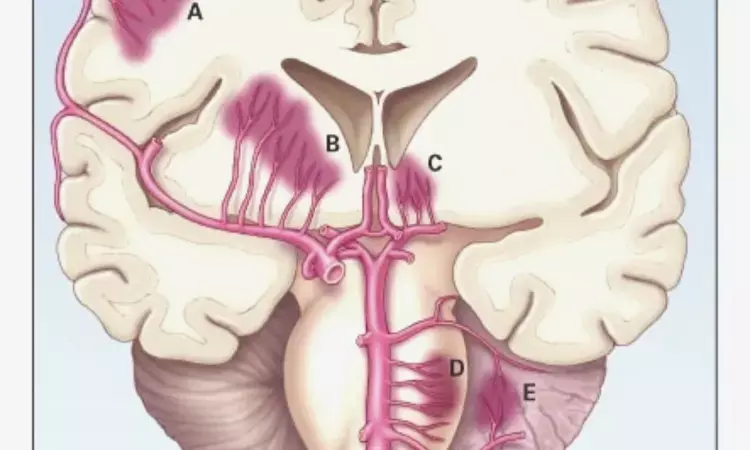- Home
- Medical news & Guidelines
- Anesthesiology
- Cardiology and CTVS
- Critical Care
- Dentistry
- Dermatology
- Diabetes and Endocrinology
- ENT
- Gastroenterology
- Medicine
- Nephrology
- Neurology
- Obstretics-Gynaecology
- Oncology
- Ophthalmology
- Orthopaedics
- Pediatrics-Neonatology
- Psychiatry
- Pulmonology
- Radiology
- Surgery
- Urology
- Laboratory Medicine
- Diet
- Nursing
- Paramedical
- Physiotherapy
- Health news
- Fact Check
- Bone Health Fact Check
- Brain Health Fact Check
- Cancer Related Fact Check
- Child Care Fact Check
- Dental and oral health fact check
- Diabetes and metabolic health fact check
- Diet and Nutrition Fact Check
- Eye and ENT Care Fact Check
- Fitness fact check
- Gut health fact check
- Heart health fact check
- Kidney health fact check
- Medical education fact check
- Men's health fact check
- Respiratory fact check
- Skin and hair care fact check
- Vaccine and Immunization fact check
- Women's health fact check
- AYUSH
- State News
- Andaman and Nicobar Islands
- Andhra Pradesh
- Arunachal Pradesh
- Assam
- Bihar
- Chandigarh
- Chattisgarh
- Dadra and Nagar Haveli
- Daman and Diu
- Delhi
- Goa
- Gujarat
- Haryana
- Himachal Pradesh
- Jammu & Kashmir
- Jharkhand
- Karnataka
- Kerala
- Ladakh
- Lakshadweep
- Madhya Pradesh
- Maharashtra
- Manipur
- Meghalaya
- Mizoram
- Nagaland
- Odisha
- Puducherry
- Punjab
- Rajasthan
- Sikkim
- Tamil Nadu
- Telangana
- Tripura
- Uttar Pradesh
- Uttrakhand
- West Bengal
- Medical Education
- Industry
High serum caspase-8 concentration predicts death risk in spontaneous intracerebral haemorrhage

Spain: A recent study in the journal Anaesthesia Critical Care & Pain Medicine has revealed an associaiton between high serum caspase-8 concentrations and mortality in spontaneous intracerebral haemorrhage (SIH). This implies that serum caspase-8 levels could be utilized as prognostic biomarker mortality.
"Results showed that non-surviving at 30 days had higher serum caspase-8 levels than surviving patients, " Leonardo Lorente, Intensive Care Unit, Hospital Universitario de Canarias, Ofra s/n, La Laguna, Santa Cruz de Tenerife, Spain, and colleagues wrote in their study.
Apoptotic changes in brain samples have been seen in haematoma areas of SIH patients undergoing surgical haematoma evacuation. However, there is no description of circulating caspase-8 concentrations in SIH patients. Considering this, Dr. Lorente and the team aimed to explore an association of circulating caspase-8 concentrations and mortality in SIH patients in a observational and prospective study.
For this purpose, patients with severe and supratentorial SIH were included. If Glasgow Coma Scale (GCS) was lower than 9, SIH was established to be severe. Intensive Care Units from 5 Spanish hospitals carried out the recruitment of patients. Serum caspase-8 levels was registered at moment of severe SIH diagnosis and 30-day mortality.
Salient findings of the study include:
- Surviving (n = 41) in respect to non-surviving SIH patients (n = 38) showed lower serum caspase-8 levels.
- The area under the curve to estimate 30-day mortality ability by serum caspase-8 levels was 0.75.
- Kaplan-Meier analysis found that patients with serum caspase-8 levels > 17.8 ng/mL showed higher death risk (Hazard ratio = 3.9).
- Multiple logistic regression analysis revealed the association of serum caspase-8 concentrations (controlling for intracerebral haemorrhage score, midline shift and early haematoma evacuation) with mortality at 30 days (Odds Ratio = 1.048).
"The main of novel findings that have been revealed in our study is the association of serum caspase-8 concentrations with mortality of SIH patient mortality," wrote the authors.
Reference:
The study titled, "Mortality of spontaneous intracerebral haemorrhage patients and high serum caspase-8 concentrations," was published in the journal Anaesthesia Critical Care & Pain Medicine.
Dr Kamal Kant Kohli-MBBS, DTCD- a chest specialist with more than 30 years of practice and a flair for writing clinical articles, Dr Kamal Kant Kohli joined Medical Dialogues as a Chief Editor of Medical News. Besides writing articles, as an editor, he proofreads and verifies all the medical content published on Medical Dialogues including those coming from journals, studies,medical conferences,guidelines etc. Email: drkohli@medicaldialogues.in. Contact no. 011-43720751


